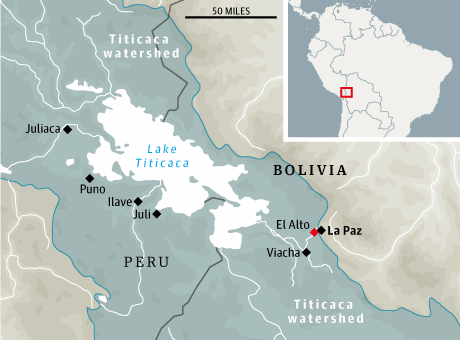South America's most famous lake is being polluted by increasing
levels of waste from fast-growing cities, according to locals,
environmentalists and politicians.
Lake Titicaca, which sits on the border of Bolivia and Peru,
has sustained agricultural societies on the dry, high-altitude Andean
plains for thousands of years, but is now threatened by a population boom from nearby cities and towns.
El
Alto has grown at 4% a year for two decades as rural peasants seek a
better life, and is now the country's second largest city and the
largest urban centre in the Titicaca watershed.
But this migration has had devastating effects on the rivers
of El Alto, communities downstream and Lake Titicaca. Raw sewage,
garbage and industrial waste are all dumped into the Seco River, which
flows through the heart of El Alto. At the edge of the city, where the
Seco begins a 40-mile journey toward Lake Titicaca, it also receives
treated wastewater from the city's severely overtaxed treatment plant.
Those waters mix and travel out over the flat plains.
Because of
its size and history, El Alto is a political powerhouse, yet the chronic
poverty and lack of access to services widely faced by Bolivia's
indigenous peoples persist there, and tackling pollution
is a struggle. Changing the waste disposal habits of the sparsely
populated countryside is one obstacle. But at the heart of the matter is
weak enforcement of environmental laws and inadequate infrastructure.
"There
is no complete and structured treatment of wastewater," said Marco
Ribera Arismendi of the Environmental Defense League in La Paz. "The
things governments have done so far are like giving an aspirin to
someone who has been shot."
Edgar Patana Ticona, El Alto's mayor,
says trying to enforce environmental standards in the city is a tough
task. "If we monitor a specific business then the people who work there,
the owner and all the neighbours begin to protest," he said. "And not
so that we enforce the rules - but so the business can continue
operating."
El Alto's budget depends on Bolivia's central
government, and collects little from local taxes. A constantly expanding
network brings drinking water
to about 80% of the city's homes, and international funds are helping
install more sewers – but the construction of a new plant to treat more
wastewater is, at best, years away.

Read more:

No comments:
Post a Comment